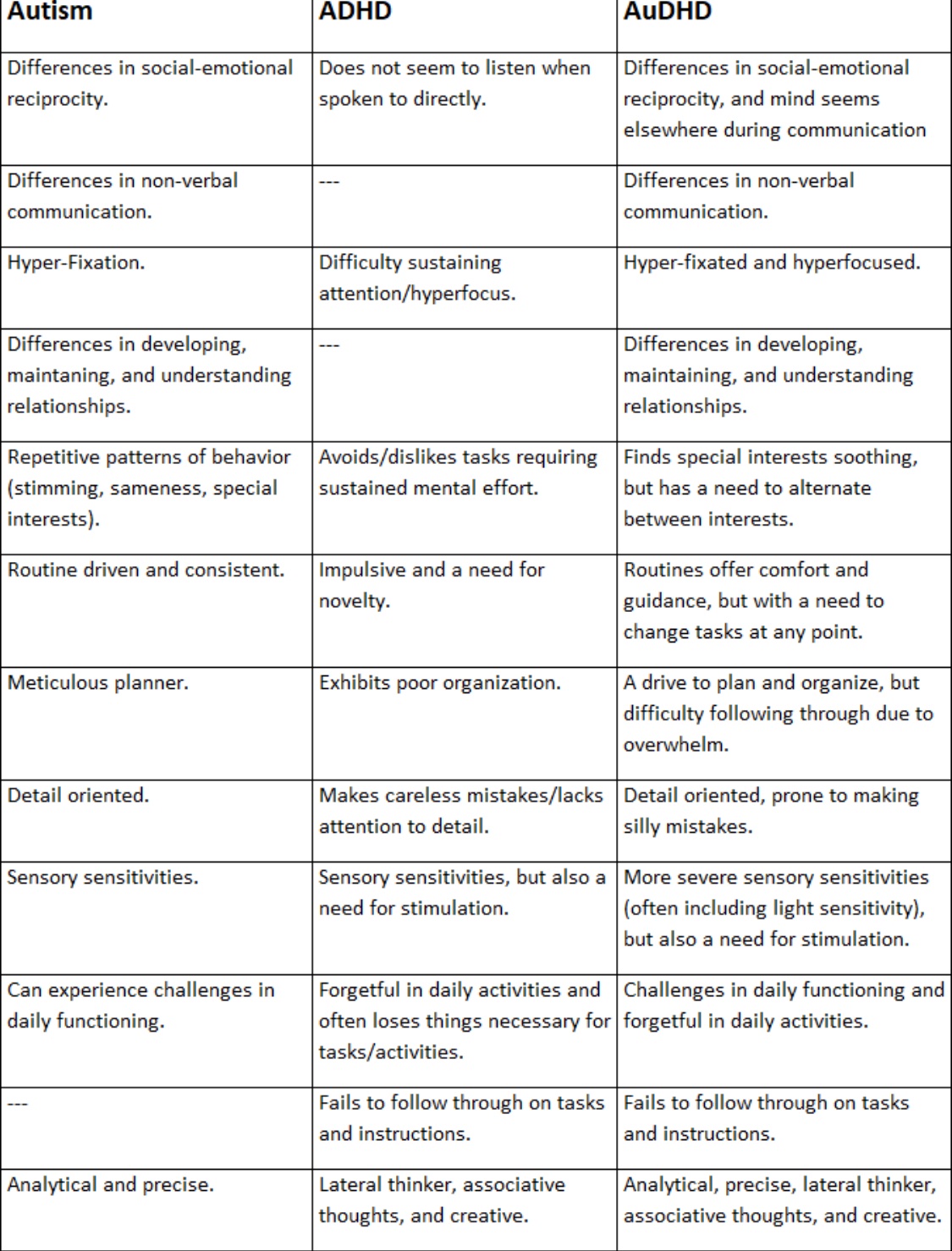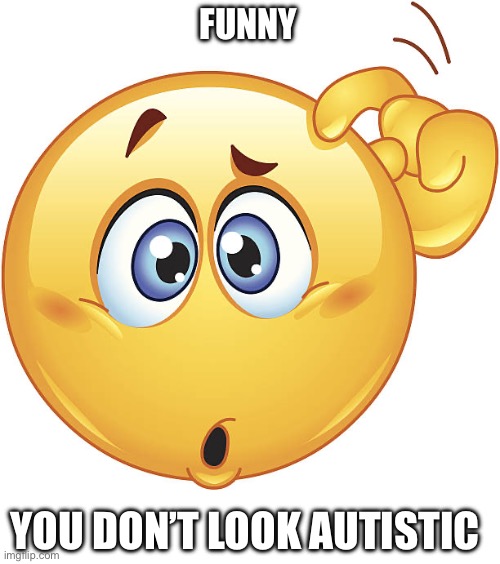I was diagnosed with autism and I don’t believe it. But that’s just the ADHD balancing shit out.
I remember watching some shitty reality show on Netflix and one of the contestants was very obviously ADHD and out of control because of it. And all I could think was… I’m so glad I have Autism to balance out the ADHD, otherwise I’d probably be like him
please excuse my ignorance but how do they balance out? my understanding was that adhd makes it hard to pay attention to things and you tend to be hyperactive while autism makes it difficult to understand social norms and situations, how would it help your deficit in attention to be less aware of how to interact with other people? wouldn’t it just make it worse? or is it just because you just don’t care if you’re hyper and not paying attention because social norms don’t interest you? genuinely curious and eager to learn

This chart explains it better than I could, but basically you are right in the sense that some things can definitely be worse with both. However, some things can somewhat balance each other out as well.
In the show I watched, the dude seemed to have such bad ADHD that (for example) he’d be in a serious conversation and suddenly hold up a fruit and be like “Man, tangerines are so good. You wanna bite??”, and it was like he wasn’t even serious about the conversation at all. He did shit like that constantly, and didn’t seem to be aware of how much he was pissing people off because of it. For me… I definitely start to get antsy and semi-checkout of a conversation if I’m not interested or knowledgeable about the topic at hand and it’s going on too long. However, because i’ve learned to mask in social conversations and gotten really good at reading people’s reactions, I can usually tell if I’m doing anything to annoy someone. And so, I can pull myself back on track through a conversation without too much difficulties, most of the time anyway. At the very least, I would never just let myself do what the guy in the show did, as I know that would piss people off!
interesting, thanks for the detailed response! So it seems that learning to live with autism you have trained skills to compensate and these skills have helped you in other parts of your life like dealing with ADHD?
This has never been my experience with autistic people. My brother, cousins, and coworkers are autistic. Very often they’re the last to know, and everyone else after interacting with them will then talk to other people and say “I think they’re on the spectrum.”
In my world, the idea that someone on the spectrum would be good in school and be well behaved is largely unrelated to autism. Autism stands out most socially, in my experience, and I don’t mean to shame anyone on that front, it’s just how I notice it.
I have a coworker that was raised by two autistic parents and has an older brother that is autistic, but he’s convinced he’s not. I guess that comes from his parents not wanting their children to deal with being “labeled” autistic. That’s why his brother didn’t get a “diagnosis” until his late 20s.
I’m not a medical doctor or whatever, but treating my coworker like my autistic brother makes things a lot easier for him. There’s no stigma around autism to me, but I know that can be a stigma. I quite like autistic people. You can be much more direct with them and they appreciate it. It’s often a more honest relationship.
People are people, and people be in all kinds of different ways. Try to love all the variations! It’s the flavor of humanity.
I was told all throughout my teenage years by family that I was labelled and that I’m not actually autistic. This was despite me being officially diagnosed with Asperger’s at 7.
It was when people started immediately picking it out that I stopped hiding it.
If it makes you feel any better, I was diagnosed almost 20 years ago and people still do not fully believe it. I’m going to be 36 this year…
I figured out I was on the spectrum in my late 20’s. A few years later we learned that my young nephew was diagnosed with it as well.
I’m now realizing that about half of my aunts and uncles on my mother’s side tend to be quirky loners. My sister herself (autistic nephew’s mother) has some serious personality quirks of her own that could be attributed to being in the spectrum.
Knowing that genetics can increase the probability of being on the spectrum, I’m starting to wonder if I’m the only one to suspect how widespread it could be in the family. I don’t know what to do with that information.
I met a friend with autism when we worked together years ago. One day he came to me and said “I’ve been talking to some people and doing some tests and it looks like I might have autism.”
I looked at him for a few seconds and said “wait, you didn’t know?”
“You knew and didn’t say anything?!”
“Well I thought you knew! It’s not really casual work chat ‘hey man, how was your weekend? BTW looks like you’re a bit autistic’”I have a similar thing with a friend. He’s mid 30s and at that point I am very sure he is on the spectrum. But I don’t know how to speak to him about it because I think he doesn’t know. He had a lot of difficulties in life, both social and academic, and it feels like it could go one of three ways. Either he will be surprised, look into it, and finally make sense of everything. Or he will be surprised and then be even sadder because someone saw him as autistic. Or he actually does know and will be sad that it is so obvious that I noticed.
First of all - don’t think of autism as a bad thing. It’s a perfectly normal (and even valuable) way for someone’s brain to be wired.
Second, a kind and casual way of approaching it is “Hey, have you ever been checked for ADHD or autism?” It’s especially useful if they bring up any of the usual difficulties that ND folks experience far more often than our NT peers.
That’s really not true beyond the mildest of mild cases. I worked with autistic adults and it really was not helping them.
Yea, exactly. It’s a tough one, but I do often wonder if I should have mentioned something
Two of the people i told i had autism were confused, replying “but you dont have any hearing problems”
For context: “aud” is the romanian word for I hear
Why is this so true
I See You

In a conversation my wife implied that I was autistic. I never thought of myself as someone who was. It had never been something I considered previously until up to about a year ago mainly because I’m not a very social person and so I found labeling myself to be unproductive, uninteresting. It doesn’t help me at work or in my home projects. I understand that that’s a naïve point of view because we can learn from the experiences of others, but it was my point of view at the time.
I asked her about that comment later and it was returned with an oh honey you poor thing… I know you are with certainty because I am one too. You’d have to be blind not to see that.
I can usually tell from the rarely looking at me when they speak, having an unusual depth of knowledge on weird facts, or problems with competitive games. My stepson was ASD. That also helped.
What’re the issues with competitive games?
I can’t speak for them (obviously), but I hate competing because I feel guilty if I win and a failure if I lose
Interesting. I remember intentionally slowing to come second in a race when I was younger.
Fucking hell. Yes. And if we lose and I know I wasn’t giving it 100% focus I feel even worse.
Because:
- neurotypicals think it’s an insult
- neurotypicals won’t acknowledge a fact that could be insulting, unless their intension is to insult someone
- seeing it as an insult leads to them thinking you’re insulting yourself
- they think you’re looking for validation by asking for a self-insult-countering from them
They think it’s this convesation:
“I’m no good”
“I think you’re great”
“No I really think I’m no good”
“No I really think you’re great”
“Aww thanks you’re such a good friend” <-- this part is missing for themThen you failing to acknowledge their support gets interpreted as an insult to them.
I know, it’s exhausting. But we just gotta keep an open mind and remember that neurotypicals can be great friends and productive members of society with a little understanding and love
But we just gotta keep an open mind and remember that neurotypicals can be great friends and productive members of society with a little understanding and love
😆 Nice. 👍
As a (I assume) neurotypical person, this seems somewhat insulting to me. I like to think I’m a very conscientious person and have a reasonable understanding of neurodiversity - I don’t think I’d respond in the ways portrayed in this cartoon.
That said the cartoon itself I found amusing, but your comment seemingly to paint us all with such a broadbrush seems insulting.
Does nobody /s on Lemmy?
Some people listen, where others solely talk.
I think I’m autistic

/s
I know I was well behaved and did well in school 😢
I know i am. Makes face to face interaction a dicy deal at best and an impossibility at worst. Makes interviews extremely uncomfortable
In America a diagnosis is a prerequisite for qualifying for services under any kind of insurance.
As a result a diagnosis is generally viewed entirely under the lens of qualifying for services and support billable to insurance.
And the problem with spectrums is that everyone is on them. So there are plenty of people who do not need services or support who are also neurodivergent. Though it appears this is generally what autistic people who aren’t in need of services or support are often called.





